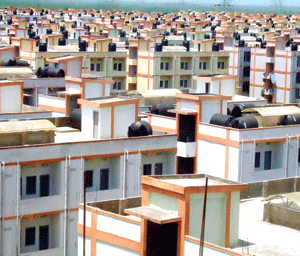C Hari Kiran, Municipal Commissioner, Vijayawada Municipal Corporation
The Vijayawada Municipal Corporation (VMC) handles various departments such as urban community development, city planning, department of engineering, horticulture and education.
A compact city, there has been no expansion to Vijayawada´s limit since 1985. C Hari Kiran, Municipal Commissioner, Vijayawada Municipal Corporation speaks to AHLAM RAIS on the latest developments and technologies adopted by the corporation.
Which JNNURM projects is the corporation planning to undertake?
At present, we have about 19 JNNURM projects and my aim is to complete them. Of these, eight are basic service projects for housing and 11 are related to urban infrastructure. Infrastructure is the basic tenet of any corporation and once all these projects are complete, the city will have quality roads, the sewerage network will be 85 per cent complete and it will also witness improved water supply to the unconnected areas in the region. We have about 117 master plan road proposals, 53 junction improvement proposals along with a few road over bridges (ROB) and a road under bridge (RUB) under the transitional phase of JNNURM. These projects have already been sanctioned by the state-level committees and are awaiting the Central Government´s approval. At present, there are a few flyovers in the region owing to which there is a lot of congestion. Hence, we plan to build ROBs for better connectivity and to ease out traffic. We have already submitted a proposal of Rs 110 crore for these projects.
Kindly elaborate on the city´s ongoing projects.
All our ongoing projects are JNNURM projects. We have almost laid a sewerage project in old Vijayawada as it did not possess a sewerage network earlier. Now, we are constructing a sewage treatment plant. Once this project is completed, we can connect almost 25,000-30,000 families to the sewerage network. The other major projects include two water supply projects, five underground drainage projects, one road project and a few other infrastructure projects. JNNURM´s total investment in these projects is Rs 1,333 crore. In terms of budget, we receive Rs 560 crore from the Government of India and Rs 300 crore from the Andhra Pradesh Government; the corporation´s share is Rs 389 crore.
What tenders have been recently floated or are yet to be floated by the corporation?
We are planning to enter into a PPP mode for the installation of a waste-to-energy plant in the city. For this, we have already invited proposals and have received about 10 to date. We will also soon finalise the land on which the plant will be built. The corporation has another PPP project in the pipeline for street lighting. We have already entered into a PPP project with the Real Energy of Hyderabad company for this segment; however, their contract period will end by August 2014. At present, we have 40,000 streetlights that we have to maintain in partnership with IFFCO. Currently, we are yet to finalise on the technology we will adopt for these lighting systems such as LED lights, etc. Once this is finalised, we will float the tender.
What is the current status of the Vijayawada Metro?
Sudhir Krishna, the Secretary of Urban Development had visited the region last month and discussed the Vijayawada Metro project. However, the Metro is a part of the Andhra Pradesh Reorganisation Bill and will be taken up by the Vijayawada Urban Development Authority. Currently, the minister has asked the concerned authorities to submit proposals to conduct the feasibility study.
As the city may well be marked as the new capital, how will this impact real-estate development? What are the hot spots within the city in terms of growth?
The possibility that Vijayawada along with Guntur will be marked as the new capital will definitely have an impact on the city´s real-estate development. Vacant land prices have already increased seven to eight times leading to a standstill or saturation in purchase of these lands. Core areas of the city such as MG Road, Karl Marks Road and surrounding areas are also saturated. In terms of growth, surrounding villages such as Jakkampudi and others could be considered as upcoming areas of development.
Tell us about innovations and new technologies adopted by the corporation.
We have installed dimmers in streetlights that dim the lights automatically after 11 pm to save energy. Moreover, we also have installed timers in the system, which turns on and off as per the season. We have also started an online method to fill property tax. Apart from that, we are planning a new scientific door numbering system. At present, the door numbering is haphazard. With the help of the system, every property in Vijayawada will be photographed and documented. Further, with the support of the United Nations Development Programme, we have developed a disaster management plan - we have 33 customised SMSes that will be sent out to the masses and officers during extreme climatic conditions. The message will be an update on the 24-48 hours weather forecast to prevent casualties.
The Andhra Pradesh Government has promised to develop Vijayawada into a mega city. With this in mind, what are your future plans for the city?
As the city is compact, alternate roads have to be created along with road junctions. Both NH-5, which connects Chennai to Kolkata, and NH-9 from Hyderabad intersect at the city; however, we do not have a bypass and this causes heavy traffic. Hence, National Highway authorities are planning to construct an outer ring road to divert the traffic on these highways. We look forward to create a more planned city.
Vijayawada Municipal Corporation
Year of establishment: 1888 (municipality); 1981 (corporation)
Total area: 61.88 sq km
Population: 11 lakh
Annual civil budget: Rs400 crore
Number of municipal councillors: 59





















